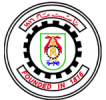MEP 101 Engineering Thermodynamics (1) (4+2)
Fundamental concepts – Pure substances – First law of thermodynamics and applications – Second law of thermodynamics and corollaries – Entropy (in classical approach).
MDP 101 Stress Analysis (4+2)
Equilibrium, continuity, material mechanical behavior – Normal force, shearing force, bending and twisting moment diagrams – Stresses in simply loaded elastic bars: axial loading, bending and torsion, deformation, stiffness, strain energy. Stresses in elastic and elasto-plastic bars, residual stresses. Combined loading, eccentric normal load, oblique bending : combined bending and torsion. Two-dimensional stresses, principal stresses, maximum shear stress, allowable stresses, Mohr’s circle representation. Application to some simple frames, thin-vessels, springs, load and displacement measurement.
MDP 104 Machine Drawing (2+6)
Assembly drawing, working drawing, dimensioning, limits, fits, tolerances, surface roughness. Standard machine elements (bolts, nuts, keys, gears, pipe connections, etc.) – Welding and riveting conventions – Introduction to computer aided drawing.
MDP 106 Strength and testing of Materials (2+1)
Metallic and non-metallic materials – Mechanical properties – Standard specifications – Mechanical testing: tension, compression, bending, torsion and hardness – Principles of fracture mechanics.
MDP 108 Engineering Metrology (2+2)
Introduction and definitions- Standards (line and surface) – Errors in measurement- Linear measurements – Vernier design – Micrometers: testing and calibration – Angle measurement – Vernier protractors – Sine bar – Precision level – Angle gauges – Auto – Collimators – Use of balls and rollers in measurement – Limit gauges – Geometrical tolerances – Comparators – Slip gauge comparators – Light interference and its applications – Tests of straightness and flatness – surface roughness – Screw thread measurements – Gear measurements.
MTH 113 (B) Mathematics (2) (4+2) (4+1)
Series solution of differential equations – Curve fitting and interpolation – Multiple integrals – Vector analysis – Theory of probability
GEN 113 Evolution of Mechanical Engineering (2+0)
Historical development of mechanical engineering – Areas of mechanical engineering: power, design and production, aerospace, vehicles, textile …etc – Examples for the development of mechanical engineering (especially the effect of computers and information technology) – Relation between the development of mechanical engineering and social and economical- Development of society – Principles of management science – The importance of management for engineers – Principles of economics – Scientific methodology and its applications in engineering sciences.
